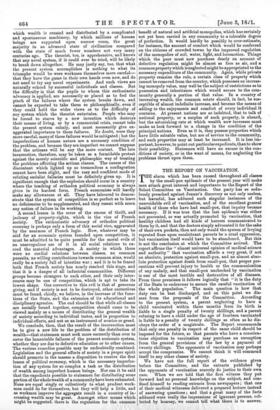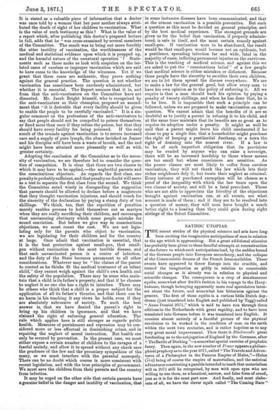THE REPORT ON VACCINATION.
THE alarm which has been caused throughout all classes by the small-pox epidemic of the present year will make men attach great interest and importance to the Report of the Select Committee on Vaccination. One party has so sedu- lously preached against Jenner's discovery as not only useless, but harmful, has adduced such singular instances of the unavoidable evil of vaccination, and of the excellent general health of those who have had small-pox, that inquiry became necessary. If it was true that the last epidemic was either not prevented, or was actually promoted by vaccination, that healthy children had all kinds of horrors communicated to them by it, and that the doctors simply advocated it for the sake of their own pockets, then not only would the system of levying repeated fines upon recalcitrant parents be a cruel oppression, but vaccination itself would have to be abandoned. But this is not the conclusion at which the Committee arrived. The report affirms the "almost universal opinion of medical science and authority" that vaccination affords a very great, if not an absolute, protection against small-pox, and an almost abso- lute protection against death from small-pox, that proper pre- cautions will prevent injury to health or the communication of any malady, and that small-pox unchecked by vaccination is one of the most terrible and destructive of all diseases. From these premisses it follows logically that "it is the duty of the State to endeavour to secure the careful vaccination of the whole population." The main question is how that duty can be best discharged, and on this point we dis- sent from the proposals of the Committee.. According to the present system, a parent neglecting to have a child vaccinated within three months from its birth is liable to a single penalty of twenty shillings, and a parent refusing to have a child under the age of fourteen vaccinated is liable to a penalty of twenty shillings as often as he dis- obeys the order of a magistrate. The Report recommends that only one penalty in respect of the same child should be imposed for the future, so that parents who have a conscien- tious objection to vaccination may purchase an exemption from the general provisions of the law by a payment of twenty shillings. The opponents of vaccination may perhaps accept the compromise. We cannot think it will commend itself to any other classes of society.
We have not the full report of the evidence given before the Committee, and the extracts published by the opponents of vaccination scarcely do justice to their own case. When we are told that the first witness they put forward had no personal knowledge on the subject, and con- fined himself to reading extracts from newspapers ; that one of their medical witnesses delivered a prepared lecture instead of answering questions ; and that a great many of the facts adduced were really the impressions of ignorant persons, col- lected by hearsay, we cannot tell what there is to answer.
It is stated as a valuable piece of information that a doctor was once told by a woman that her poor mother always attri- buted the death of eight of her children to vaccination. What is the value of such testimony as this? What is the value of a report which, after publishing this doctor's prepared lecture in full, adds that he "was cross-examined by several members of the Committee. The result was to bring out more forcibly the utter inutility of vaccination, the worthlessness of the medical and statistical evidence upon which it is propped up, and the harmful nature of the unnatural operation"? State- ments such as these make us look with suspicion on the iso- lated cases of careless or improper vaccination which are said to have come to the knowledge of the witnesses. Yet if we grant that these cases are authentic, they prove nothing against the general practice. The question is not whether vaccination has sometimes been carelessly administered, but whether it is essential. The Report assumes that it is, and from that the anti-vaccinators on the Committee have not dissented. Mr. Jacob Bright himself, who is recognized by the anti-vaccinators as their champion, proposed an amend- ment that "it is desirable that every facility should be given to enable the people to be carefully vaccinated." It is a sin- gular comment on the professions of the anti-vaccinators to say that people should not be compelled to poison themselves, or fined more than once if they refuse the poison, but that they should have every facility for being poisoned. If the only result of the crusade against vaccination is to secure increased care and a supply of pure lymph, the abuse lavished on Jenner and his disciples will have been a waste of breath, and the end might have been attained more pleasantly as well as with greater certainty.
Adopting the conclusion of the Committee as to the neces- sity of vaccination, we are therefore led to consider the ques- tion of compulsion. It is clear that there are two classes to which it may have to be applied,—the neglectful parents and the conscientious objectors. As regards the first class, one penalty is probably sufficient, and that penalty no doubt will serve as a test to separate the first class from the second. We think the Committee acted wisely in disregarding the suggestion that parents should be allowed to declare before a magistrate that they thought vaccination injurious, and should vouch for the sincerity of the declaration by paying a stamp duty of ten shillings. We think, too, that the repetition of penalties merely enables persons to hold themselves out as martyrs when they are really sacrificing their children, and encourages that unreasoning obstinacy which some people mistake for sound conviction. But before we give way to conscientious objections, we must count the cost. We are not legis- lating only for the parents who object to vaccination, we are legislating for their children and for the country at large. Once admit that vaccination is essential, that it is the best protection against small-pox, that small- pox without vaccination is the most terrible disease, and that each unvaccinated person is a centre of infection, and the duty of the State becomes paramount to all other considerations. Whatever may be "the claims of the parent to control as he thinks fit the medical treatment of an infant child," they cannot weigh against the child's own health and the safety of the population. There may be some who main- tain that a child is its father's property, and that if he chooses to neglect it no one else has a right to interfere. There may be others who think that a child is a proper subject for the application of all its father's theories, and that there can be no harm in his teaching it any views he holds, even if they are absolutely subversive of society. To such the best answer is, that we have denied the parent's right to bring up his children in ignorance, and that we have claimed the right of enforcing general education. The rule which applies here is still stronger as regards public health. Measures of punishment and repression may be con- sidered more or less effectual in diminishing crime, and in repairing the neglect of moral instruction. But health can only be secured by prevention. In the present case, we must either expose a certain number of children to the ravages of a fearful malady, and allow it to spread without any check save the prudence of the few and the pecuniary sympathies of the many, or we must interfere with the parental monopoly. There can be no doubt which course is more consistent with recent legislation, and with the true principles of government. We must save the children from their parents and the country from infection.
It may be urged on the other side that certain parents have a genuine belief in the danger and inutility of vaccination, that in some instances diseases have been communicated, and that at the utmost vaccination is a possible preventive. But such a question as this must be decided on general principles, and by the best medical experience. The strongest grounds are given us for the belief that vaccination, if properly adminis- tered, is safe in itself, and the most certain remedy against small-pox. If vaccination were to be abandoned, the result would be that small-pox would become not an epidemic, but a pestilence, spreading infection far and wide, fatal in the majority of cases, inflicting permanent injuries on the survivors. This is the teaching of medical science, and against this we are asked to put the "conscientious belief" of a few people that medical science is either mistaken or dishonest. Because these people have the sincerity to sacrifice their own children, we are to let them spread the disease everywhere. We are to make a law for the general good, but allow every man to have his own opinion as to the policy of enforcing it. All we require is that a man should back his opinion by paying a penalty of twenty shillings, and when he has done that, he is to be free. It is impossible that such a principle can be followed, unless we are prepared to make vaccination an open question. We cannot admit that the benefits of it are so doubtful as to justify a parent in refusing it to his child, and at the same time maintain that its benefits are so great as to require its adoption under a penalty. It might as well be said that a parent might leave his child uneducated if he- chose to pay a single fine, that a householder might purchase the right of keeping a pestilential dustheap, or a town the- right of draining into the nearest river. If a law is to be of such imperfect obligation that its provisions may be evaded by anyone who can raise a sovereign, there will be an increased hardship to those whose means, are too small but whose consciences are sensitive. As the poorer classes are most likely to suffer from careless vaccination, they will not thank the law which lets their richer neighbours defy it, but treats their neglect as criminal. Every instance of purchased exemption will be chosen as a proof of the inequality with which the law bears upon the two classes of society, and will be a fatal precedent. Those who are not able to appreciate the frivolity of the objections brought against vaccination can, at all events, see what. account is made of them ; and if they are to be resolved into a question of money, they will soon have bought a much_ better right to a hearing than they could gain during eight sittings of the Select Committee.



































 Previous page
Previous page